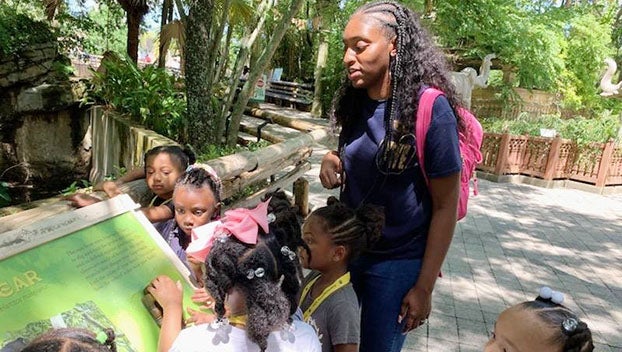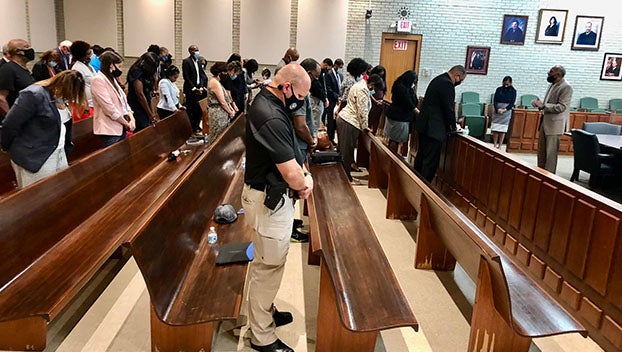Free educational support offered for all ages in the River Parishes
Published 9:00 am Saturday, September 17, 2022
|
Getting your Trinity Audio player ready...
|
National Adult Education and Family Literacy Week is September 18-24
RESERVE — Education is the basis for the wellbeing of a community, and literacy rates serve as an early indicator of future participation in the criminal justice system.
While National Adult Education and Family Literacy Week is observed September 18-24, 2022, River Parishes Community College and The Literacy Clinic are among the local entities working year-round to strengthen St. John the Baptist Parish and surrounding areas through exposure to cost-free educational opportunities for children and adults.
The Literacy Clinic launched a one-year pilot in St. John Parish on August 25, 2021, with the 40th Judicial District Court serving as a mediator to identify those who could benefit from literacy services. An additional $75,000 from the state legislature was allocated in 2022 for the second year of the program, which has now expanded to Behrman Charter School in Orleans Parish.
Efforts in St. John Parish are continuing to focus on Fifth Ward Elementary in Reserve, according to Judge Nghana Lewis of the 40th Judicial District Court. The long-term vision is to have literacy clinics operating in every district of Louisiana.
Grades K-2 have been identified for services because this is the age where children are learning to read, laying the foundation for them to read to learn in third grade and beyond.
“Before we expand to other schools, we want to go deeper into a single school to obtain data that’s reliable, transferable, and that can support our position that this is an intervention that will work to affect change,” Lewis said. “Studies indicate that if a child is not reading at grade level by third grade, there is a greater likelihood that child will not be successful in school, and that’s when you start to see problems that may ultimately lead that child to entering the criminal justice system as a juvenile.”
As St. John Parish rebounds from Hurricane Ida, Lewis said The Literacy Clinic will be hosting literacy intervention within the local library system on Saturdays, opening services to children in the community beyond Fifth Ward Elementary.
In the meantime, any St. John Parish family recognizing a need is invited to visit theliteracyclinic.org or get in touch with the 40th Judicial District Court.
“We will try our best to match that family with services through FINS,” Lewis said.
Another goal for the second year of operation is to delve into the adult component of The Literacy Clinic’s operations.
“We seek to work with adults who are in the system for non-violent, non-sex-related offenses. We are working to identify these individuals to give them an opportunity to enter into the clinic and be supported in receiving their high school diploma equivalency,” Lewis said.
The Literacy Clinic has partnered with River Parish Community College to raise awareness of adult education resources.
Approximately 16.2% of Louisianans do not have a high school diploma. In the parishes RPCC serves, the statistics are as follows:
- Assumption – 27.3%
- Iberville – 22.6%
- John the Baptist – 17.0%
- James – 14.5%
- Charles – 12.8%
- Ascension – 11.8%
According to Sarina Lirette, director of adult education at RPCC, Louisiana ranks fourth in the nation in the number of individuals without a high school diploma, and these individuals earn an average of $9,700 less annually compared to those with a diploma.
The four RPCC locations in Reserve, Boutte, Gonzales and Plaquemine as well as the satellite location in St. James offer a variety of adult education services at no cost to the community.
“Our most enrolled-in program is our high school equivalency program,” Lirette said. “There’s actually five different pathways people can take to achieve their high school equivalency, and we help them to determine which pathway works best for them.”
When an individual enrolls in the program, an assessment tool is used to determine where they are. Those who are determined to be on a sixth grade level or below are first placed in a reading intervention program to set them up for success.
The timeframe of the course will depend on the individual student’s needs.
“We do not run on a semester basis like most colleges. We operate all 12 months and are only closed 14 days out of the year,” Lirette said. “That does not mean a student will start and end in 12 months. They will start with us and stay with us until they are finished. For some students, depending on where they are when they start, that might be a few months. For others, it may be longer.”
Adult education courses are currently offered during the day and in the evening with the understanding that students have other obligations outside the classroom.
According to Lirette, RPCC also offers short-term Community Education courses which may involve digital literacy, financial literacy, or other topics specific to the needs of the community.
Individuals who obtain their high school equivalency may choose to take advantage of funding offered through the state to pursue one of RPCC’s many workforce training programs.
This upcoming week, RPCC will be promoting National Adult Education and Family Literacy Week to spread awareness of the plethora of available resources.
“We are not just a business or a college that has a building in these communities. We are a member of these communities,” Lirette said. “We understand that for a community to thrive, education and training is the basis. We recognize that everyone’s path is different, so that’s why we have different programs from adult ed to workforce training. We want to do everything we can to help those who are unemployed or underemployed obtain those skills necessary to have a better quality of life for themselves and their family, which also trickles down to the community.”
While providing support, both RPCC and The Literacy Clinic seek to identify potential barriers to education and connect individuals with resources to remove these barriers.
Lirette has noticed transportation and childcare to be common barriers to returning to school. Adult education courses are offered in face-to-face, online and hybrid formats to reach as many individuals as possible.
Lewis added that transiency and lack of stable housing has been an issue for families, particularly after Hurricane Ida. Through the literacy program, there is potential to follow these families and continue offering services to them.
Other challenges include mental health awareness and a rapidly increasing English Second Language population within the region.
ESL classes are offered at no charge through RPCC’s adult education program to increase English learners’ ability to effectively communicate with others.
For more information about RPCC programming, visit one of the campuses or fill out the inquiry form at rpcc.edu.








